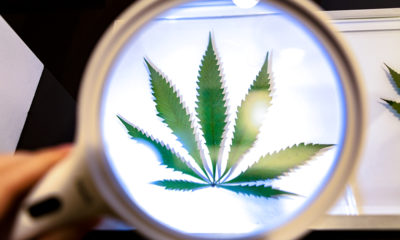
Medical
Medical Marijuana Legalized in U.S. Virgin Islands
Following a campaign by local advocates, the U.S. Virgin Islands passed a medical marijuana law that allows home cultivation for qualifying patients.
On Jan. 19, Gov. Albert Bryan Jr. of the U.S. Virgin Islands signed a new law that will make medicinal cannabis accessible to qualified patients in the U.S. territory.
“I have approved the Virgin Islands Medicinal Cannabis Care Act because it is a step in the right direction toward assisting Virgin Islanders suffering from autoimmune and other debilitating medical conditions,” Bryan said in a statement, according to the local St. John Source.
The Virgin Islands Medicinal Cannabis Patient Care Act establishes guidelines for regulated use and the licensing of dispensaries throughout the territory. Patients suffering from a list of serious ailments including cancer, HIV/AIDS, Parkinson’s disease and chronic pain will be able to receive a doctor’s recommendation for medical marijuana. Qualifying residents will be able to possess up to four ounces, with possession for non-residents capped at three ounces. A special permit will be needed for home cultivation of up to 12 plants.
As The Source elaborates, the bill creates a nine-member Cannabis Advisory Board, appointed by the governor and an Office of Cannabis Regulation, as its regulatory arm. Commercial licensees will be able to grow up to 1,000 plants. To prevent monopolies, cultivators will not also be able to own dispensaries. Revenue from sales will be used to fund drug rehabilitation and job training programs, tourism and agricultural projects and infrastructure.
Fruits of an Activist Campaign
In signing the bill, Bryan said the legislation gives effect to a 2014 referendum in which a majority of Virgin Islands voters approved the idea of a medical marijuana law. “Since the referendum, it is clear that marijuana-use policy in the United States has been changing rapidly in favor of medicinal and recreational use and will continue, even potentially on the federal level,” Bryan said.
The non-binding ballot question was approved by 56 percent of voters in November 2014, signaling majority support. A bill to legalize medicinal marijuana in the territory soundly passed the territory’s bicameral legislature on Dec. 28 of last year. The passage came after the legislature heard much testimony from advocates on the medical, economic and agricultural benefits of cannabis.
Barbara LaRonde of USVI NORML, who sat in Senate chambers all that day, was elated by the passage. “There’s so many emotions bubbling inside,” she told The Source after the vote. “I want to jump with joy. I’m thinking, ‘What’s the next step?’ It’s been a long trial to finally get to this stage.”
LaRonde said she hopes to eventually explore the possibility of allowing cannabis for sacramental use. “We do have a population of Rastafarians who have kept this tradition alive…and they should also be given the legal right to consume it in that fashion,” she said.
The Virgin Islands decriminalized cannabis in December 2014, when the legislature voted to override a veto by the territory’s then-governor, John de Jongh Jr. That law made possession of less than one ounce a civil offense punishable by a fine of up to $200. Like the just-passed medical bill, it was sponsored by Sen. Terrence “Positive” Nelson, one of the USVI’s openly Rastafarian lawmakers.
Advocates Seek Local Control Over Cannabis Industry
Concerns were raised about assuring local control of any emergent cannabis industry in the territory. Radio host and Virgin Islands historian Mario Moorhead cautioned that full legalization could lead to outside interests flooding the market with imported cannabis, or controlling local production — creating only a few low-paying jobs for those born and raised in the archipelago.
In 2016, as the debate gained momentum, The Source wrote in an editorial entitled “Legalize It Now! (But Do It Right): “If some corporation imports marijuana to this tropical island, much of the money will immediately turn around and leave the territory. Instead of young men selling on the street corners and in the bars, we will have a smaller number of young men working for minimum wage at the register in some chain shop. We can do better.”
The editorial called for legalizing only locally grown cannabis and restricting production to “traditional family farms, defined, like local fishing, by families who have traditionally engaged in farming in the USVI.”
The editorial also recognized legalization as a human rights issue, noting an egregious case in 2012, when raids on several St. Croix homes to break up a supposed marijuana ring left a local youth dead — who turned out to be the son of a prominent personage on the island.
The youth, Kendall Petersen Jr, was shot by police while fleeing his house. His father, Kendall “Seigo” Petersen, a Rastafarian elder who had been a Virgin Islands constitutional convention delegate in 2009, had been arrested a few years earlier for marijuana. Seigo Petersen died in 2014, hailed as a father figure for a generation of Crucians (as the people of St. Croix, an island within the U.S. Virgin Islands, are known). The painful affair helped spur a mandate for reform of the territory’s cannabis laws.
The U.S. Virgin Islands now join other U.S. overseas territories that have opened legal space for cannabis. Guam became the first U.S. territory to pass a medical marijuana law in 2014. Puerto Rico followed suit the next year. The Northern Mariana Islands passed a general legalization of cannabis last year.
The nation of Jamaica broke ground for sacramental use of cannabis by Rastafarians, including such provisions in its 2015 Ganja Law.
TELL US, do you think cannabis legalization rules should support local economies first?
























